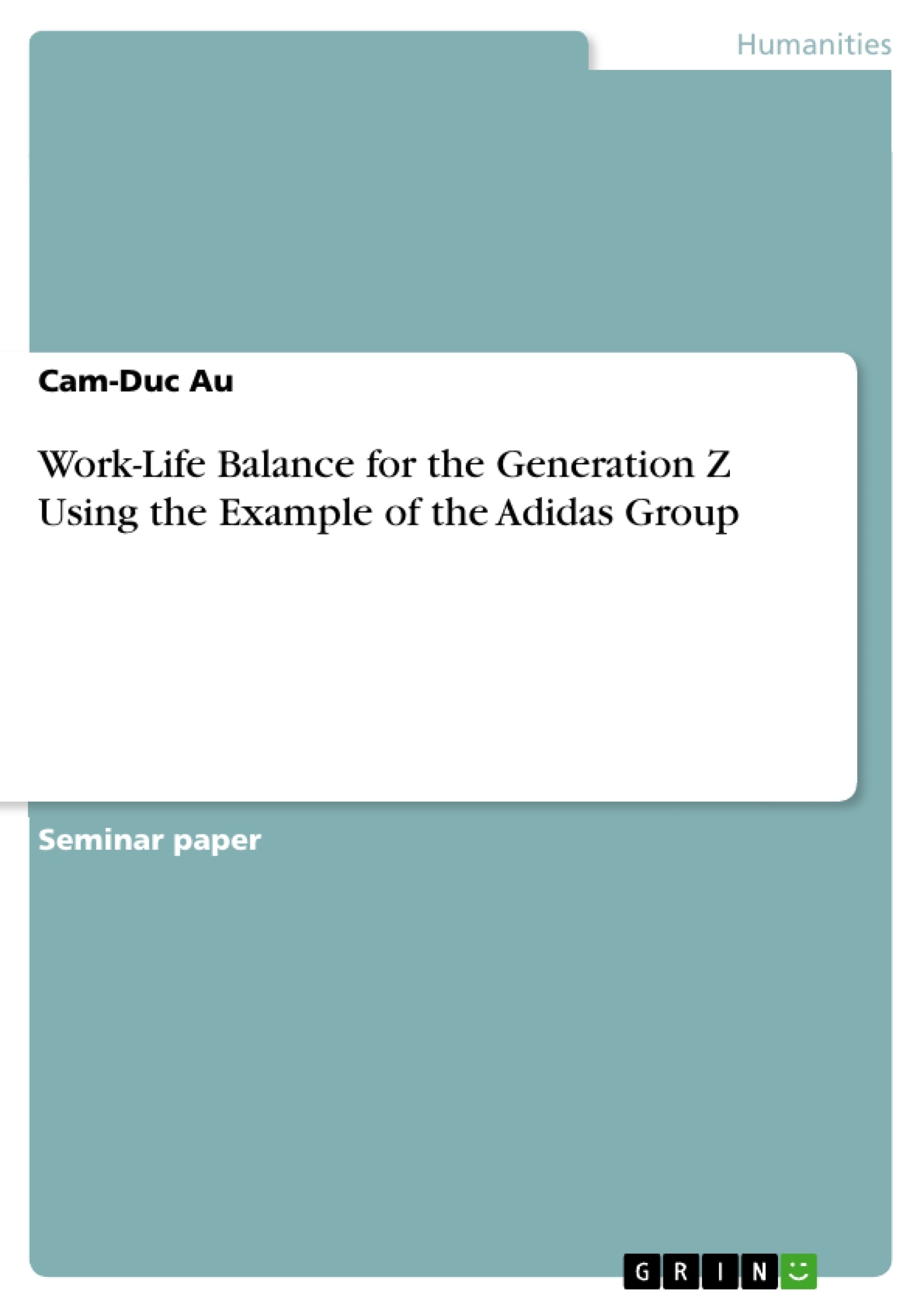The objective in this paper is the depiction of the work-life balance concept as a strategy of employer branding in order to finally improve intrinsic and extrinsic motivation as a result thereof. Focussing on the practical example of the Adidas Group and its workplace in Herzogenaurach - which is known as „The Adidas Campus“ - the emphasis lies on the evaluation how the expectations of the „Generation Z“ are met and what consequences are revealed.
The society nowadays undergoes manifold social alterations such as demographic change, globalisation or change of generations. The dynamics of these developments do not relate only to the people but also to the companies who have to accept
these challenges. The necessity to act upon the requirement of social and economic adaption lead to the formula of success. For instance, attracting young professionals by creating targeted employment conditions constitutes simultaneously the solution for lack of specialists and the aging workforce in an organisation.
According to a recent online survey conducted in Germany by the online statistics portal „Statista“, 81% of young professionals between 25 and 34 years consciously care about work-life balance. Focussing on the needs of junior employees, who also go by the term of „Generation Z“ for people born beginning from 1995, represents the current strategic orientation of companies. The „Generation Z“ or „Digital Natives“ are to be distinguished from their predecessors in terms of expectations towards employer. In comparison to the „Babyboomers“ or „Generation X“, the present generation is surrounded by the omnipresence of Internet and thus social media. Respecting this fact by providing a complying digital work environment, can influnce employer branding and employee motivation in a positive way.
Inhaltsverzeichnis (Table of Contents)
- Introduction
- Principles and Achievements of Work-Life Balance
- Definition and Emergence
- Instruments for Compromising Work and Privat Life
- Theory of Intrinsic and Extrinsic Motivation
- Reflection on the Generation Z
- Change of Generations and „War for Talents“
- Characteristics of the „Digital Natives“
- Expectation Towards Employers Based on „Statista“ Survey
- Examination on the Adidas Group „Campus“
- Methodical Approach
- Key Criteria for Success
- Evaluation in Respect of Work-Life Balance and Motivation
- Conclusion and Outlook
Zielsetzung und Themenschwerpunkte (Objectives and Key Themes)
This paper investigates the concept of work-life balance as a strategic tool for employer branding and its impact on intrinsic and extrinsic motivation. It uses the Adidas Group and its workplace in Herzogenaurach ("The Adidas Campus") as a practical example to evaluate how the expectations of Generation Z are met and the consequences revealed.
- The importance of work-life balance as a strategy for employer branding
- The characteristics and expectations of Generation Z towards employment conditions
- The role of intrinsic and extrinsic motivation in employee satisfaction and performance
- The impact of a digital work environment on employee motivation and employer branding
- Evaluation of the Adidas Group's workplace in terms of work-life balance and meeting the needs of Generation Z
Zusammenfassung der Kapitel (Chapter Summaries)
- Introduction: This chapter sets the context by discussing the societal changes driving the need for companies to adapt their practices, particularly in attracting and retaining young professionals. It emphasizes the importance of work-life balance for Generation Z and highlights the Adidas Group as a case study.
- Principles and Achievements of Work-Life Balance: This chapter defines and explores the emergence of work-life balance, examining various instruments for achieving it and the theoretical framework of intrinsic and extrinsic motivation.
- Reflection on the Generation Z: This chapter delves into the characteristics and expectations of Generation Z, considering their generational context, digital proficiency, and specific demands from employers.
- Examination on the Adidas Group "Campus": This chapter outlines the methodical approach taken to evaluate the Adidas Group's "Campus" in terms of work-life balance and employee motivation. It identifies key criteria for success and examines the specific initiatives implemented.
Schlüsselwörter (Keywords)
The primary keywords and focus topics in this paper include work-life balance, employer branding, Generation Z, digital natives, intrinsic motivation, extrinsic motivation, employee satisfaction, and the Adidas Group.
Frequently Asked Questions
How does the Adidas Group address the work-life balance of Generation Z?
The Adidas Group uses its Herzogenaurach headquarters, known as "The Adidas Campus," to provide flexible work environments and conditions tailored to the expectations of young professionals.
What are the main characteristics of Generation Z in the workplace?
Born after 1995, Generation Z members are "Digital Natives" who value digital work environments, social media presence, and a clear separation between work and private life.
What is the difference between intrinsic and extrinsic motivation?
Intrinsic motivation comes from internal satisfaction and interest in the task itself, while extrinsic motivation is driven by external rewards like salary, benefits, or office perks.
Why is employer branding important in the "War for Talents"?
Effective employer branding helps companies attract and retain specialists in a competitive market by creating an appealing image and superior working conditions.
What percentage of young professionals care about work-life balance?
According to a Statista survey cited in the paper, 81% of young professionals between 25 and 34 years consciously prioritize work-life balance.
- Citation du texte
- Cam-Duc Au (Auteur), 2016, Work-Life Balance for the Generation Z Using the Example of the Adidas Group, Munich, GRIN Verlag, https://www.grin.com/document/365341



